Browse the Collection
Browsing 42 items in our archive
-
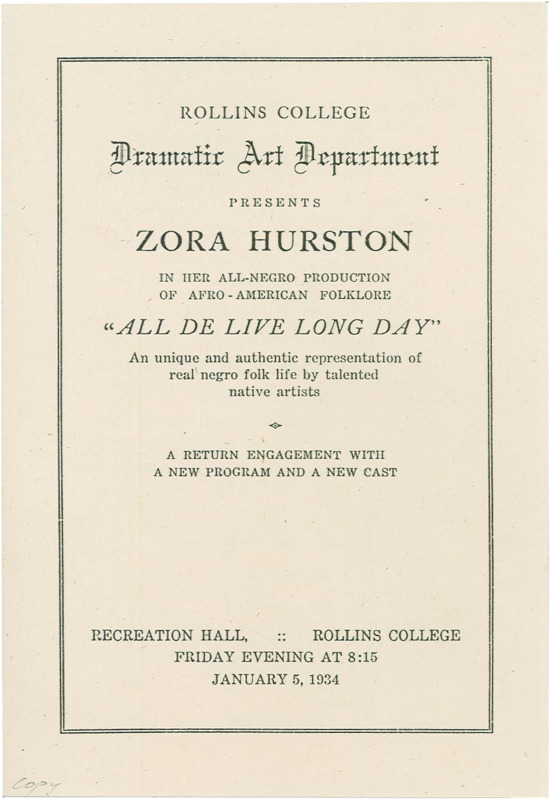 Rollins College | Text
Rollins College | TextAll De Live Long Day Program, 1934
All De Live Long Day, a program of African American folklore, music, and dance, was the second of two productions by Zora Neale Hurston to be performed on the Rollins campus during the 1930s.Learn more -
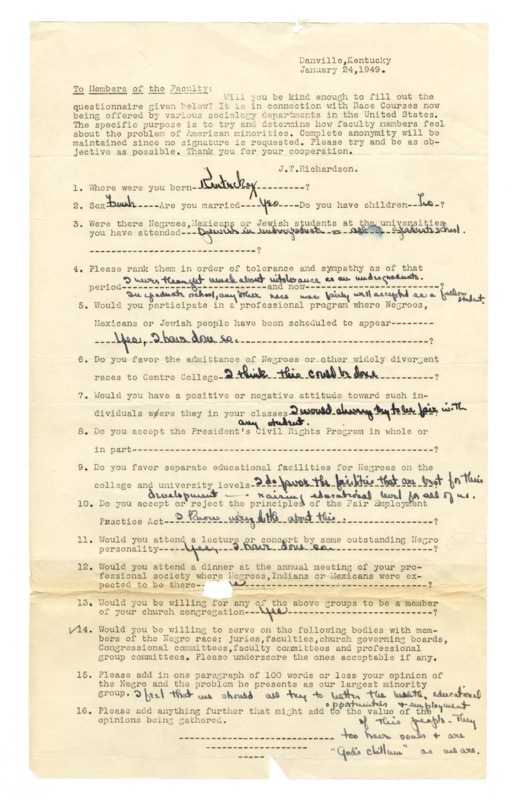 Centre College | Text
Centre College | TextAmerican minorities faculty questionnaire (1)
Anonymous responses to a questionnaire distributed to Centre College faculty January 24, 1949, the stated purpose of which was "to try an determine how faculty members feel about the problem of American minorities."Learn more -
 Centre College | Text
Centre College | TextAmerican minorities faculty questionnaire (10)
Anonymous responses to a questionnaire distributed to Centre College faculty January 24, 1949, the stated purpose of which was "to try an determine how faculty members feel about the problem of American minorities."Learn more -
 Centre College | Text
Centre College | TextAmerican minorities faculty questionnaire (11)
Anonymous responses to a questionnaire distributed to Centre College faculty January 24, 1949, the stated purpose of which was "to try an determine how faculty members feel about the problem of American minorities."Learn more -
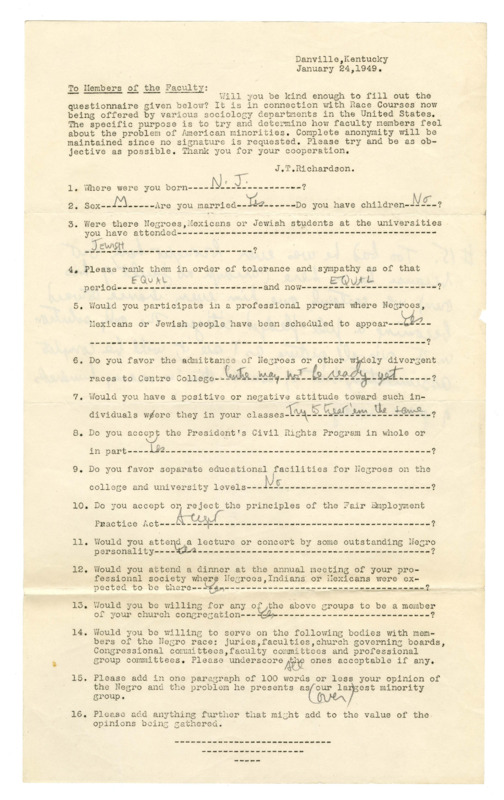 Centre College | Text
Centre College | TextAmerican minorities faculty questionnaire (12)
Anonymous responses to a questionnaire distributed to Centre College faculty January 24, 1949, the stated purpose of which was "to try an determine how faculty members feel about the problem of American minorities."Learn more -
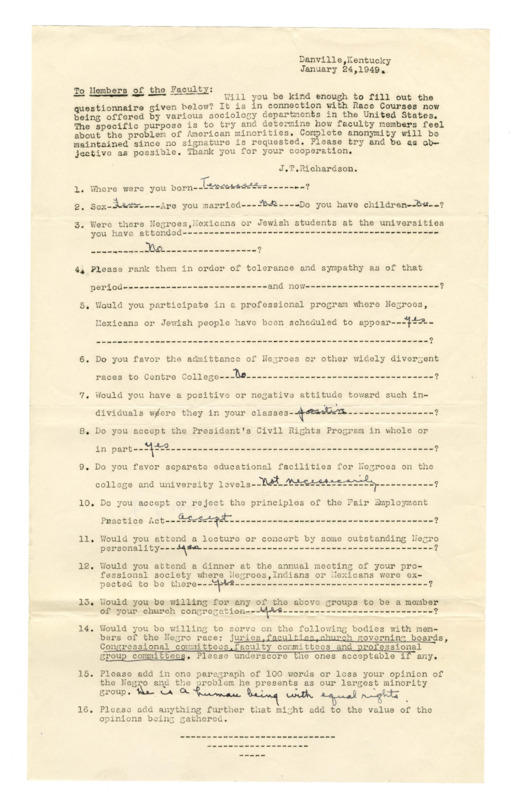 Centre College | Text
Centre College | TextAmerican minorities faculty questionnaire (2)
Anonymous responses to a questionnaire distributed to Centre College faculty January 24, 1949, the stated purpose of which was "to try an determine how faculty members feel about the problem of American minorities."Learn more -
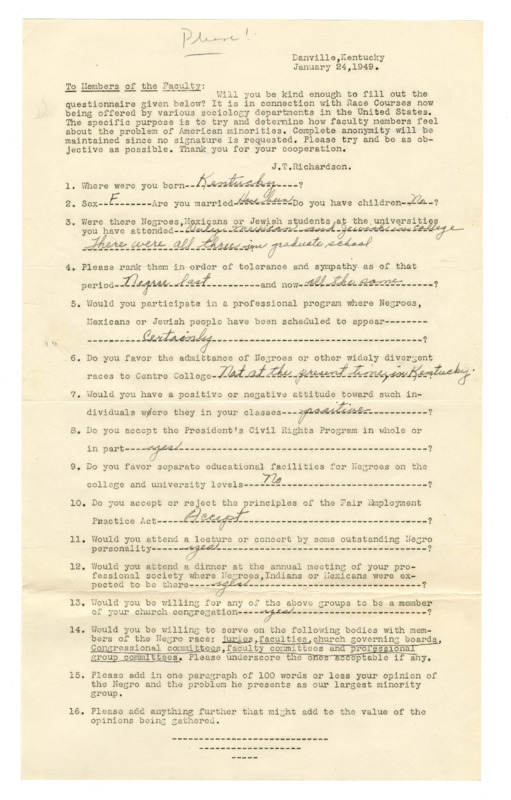 Centre College | Text
Centre College | TextAmerican minorities faculty questionnaire (3)
Anonymous responses to a questionnaire distributed to Centre College faculty January 24, 1949, the stated purpose of which was "to try an determine how faculty members feel about the problem of American minorities."Learn more -
 Centre College | Text
Centre College | TextAmerican minorities faculty questionnaire (4)
Anonymous responses to a questionnaire distributed to Centre College faculty January 24, 1949, the stated purpose of which was "to try an determine how faculty members feel about the problem of American minorities."Learn more -
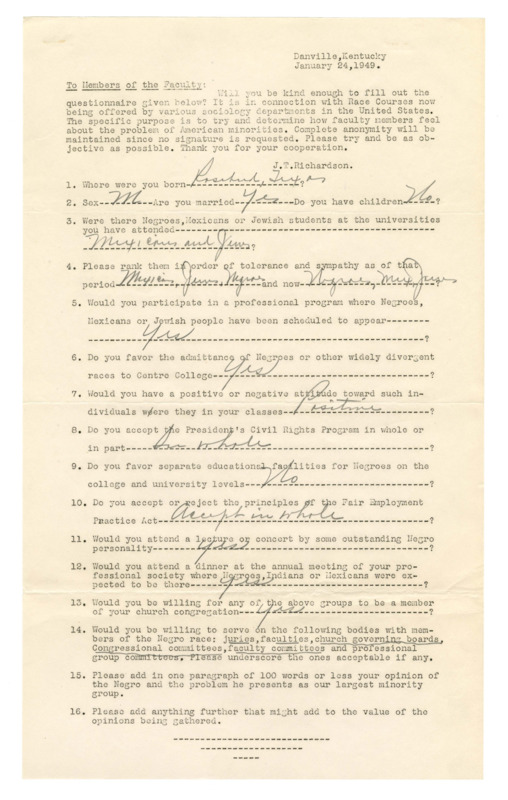 Centre College | Text
Centre College | TextAmerican minorities faculty questionnaire (5)
Anonymous responses to a questionnaire distributed to Centre College faculty January 24, 1949, the stated purpose of which was "to try an determine how faculty members feel about the problem of American minorities."Learn more -
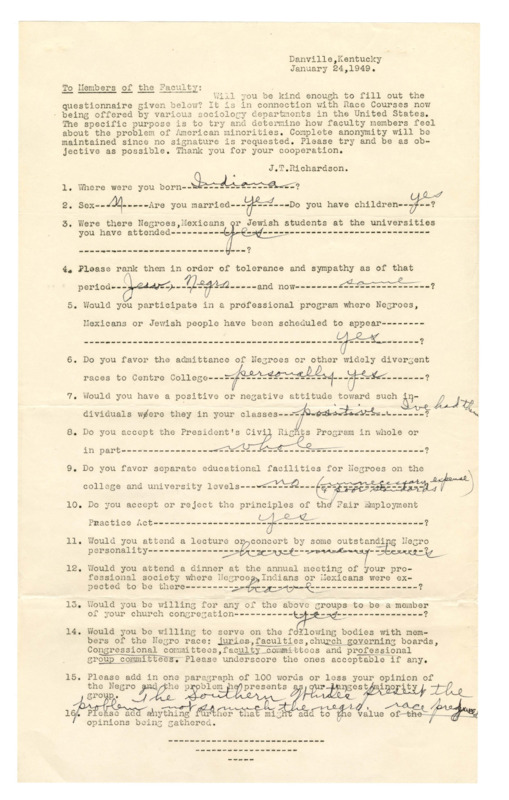 Centre College | Text
Centre College | TextAmerican minorities faculty questionnaire (6)
Anonymous responses to a questionnaire distributed to Centre College faculty January 24, 1949, the stated purpose of which was "to try an determine how faculty members feel about the problem of American minorities."Learn more -
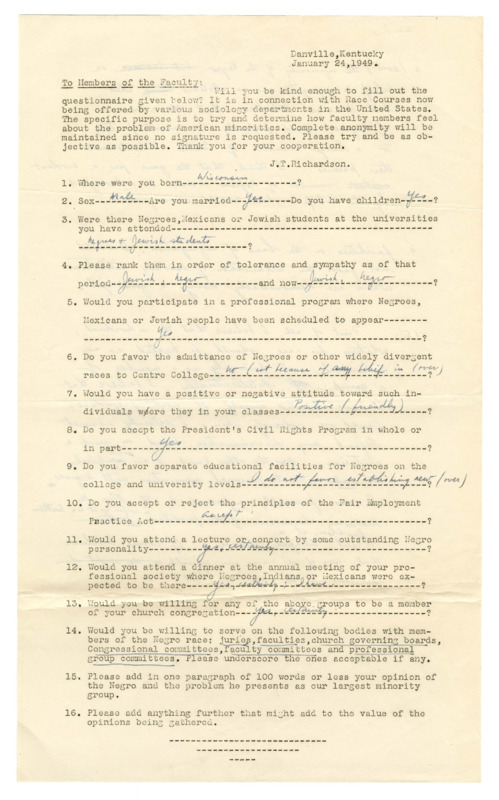 Centre College | Text
Centre College | TextAmerican minorities faculty questionnaire (7)
Anonymous responses to a questionnaire distributed to Centre College faculty January 24, 1949, the stated purpose of which was "to try an determine how faculty members feel about the problem of American minorities."Learn more -
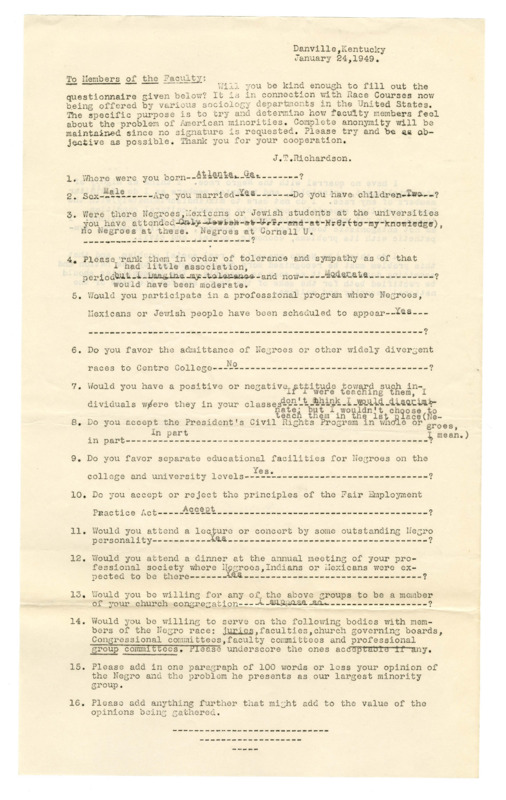 Centre College | Text
Centre College | TextAmerican minorities faculty questionnaire (8)
Anonymous responses to a questionnaire distributed to Centre College faculty January 24, 1949, the stated purpose of which was "to try an determine how faculty members feel about the problem of American minorities."Learn more -
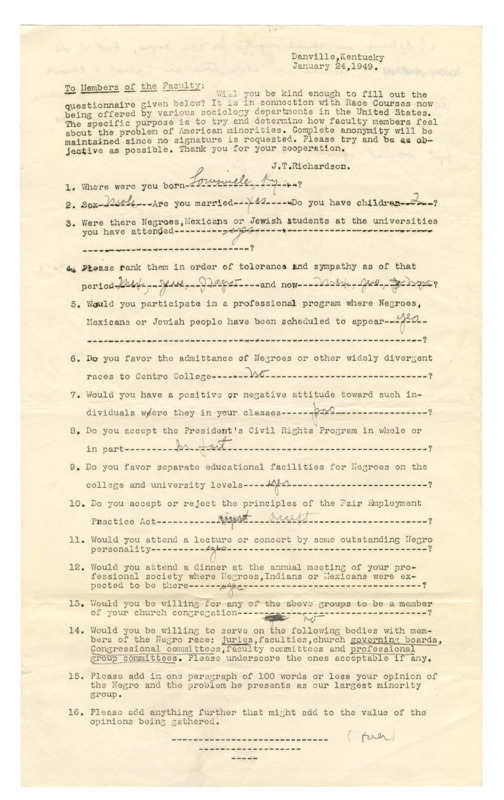 Centre College | Text
Centre College | TextAmerican minorities faculty questionnaire (9)
Anonymous responses to a questionnaire distributed to Centre College faculty January 24, 1949, the stated purpose of which was "to try an determine how faculty members feel about the problem of American minorities."Learn more -
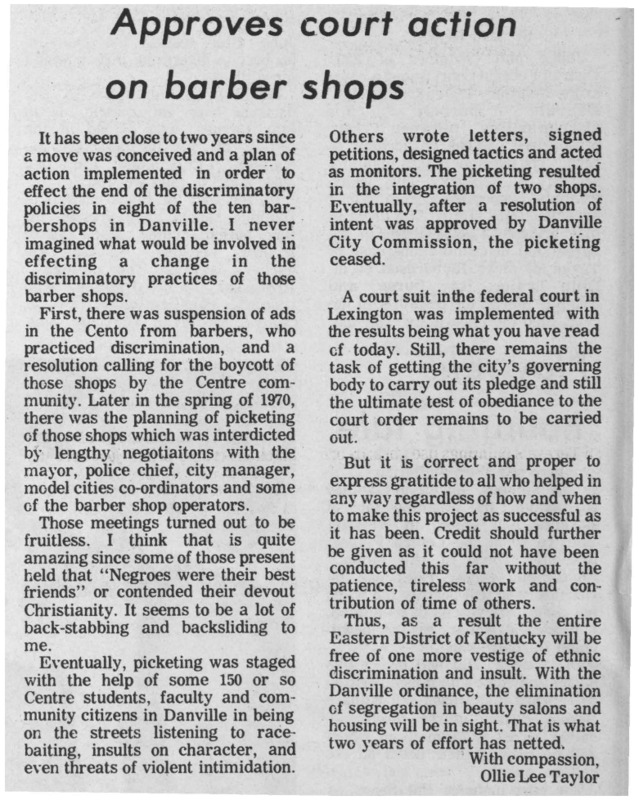 Centre College | Text
Centre College | TextApproves Court action on Barber Shops
Ollie Lee Taylor wrote a letter to express his appreciation to everyone who helped participate in the fight against discrimination in the local barbershops. He also wrote about the work that still needed to be done which included holding Danville accountable and continuing to push for change in other areas within the communityLearn more -
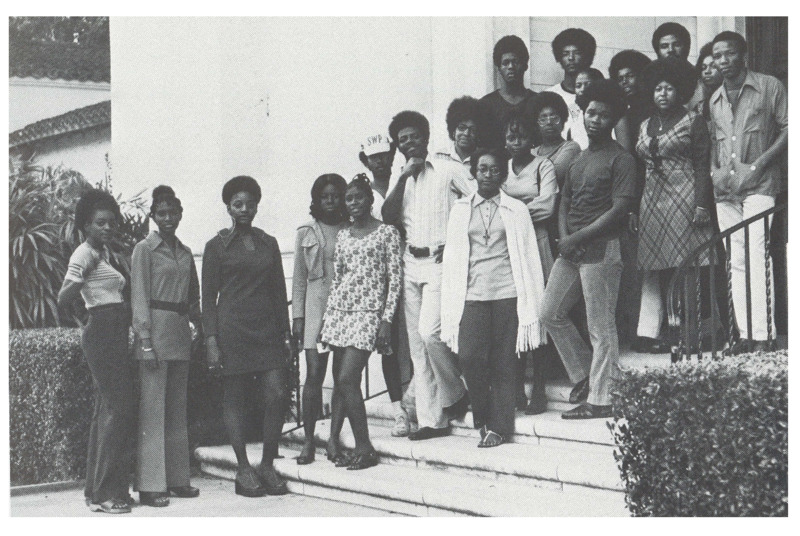 Rollins College | Image
Rollins College | ImageBlack Student Union, 1972-1973
Twenty Black Student Union members pose for their student organization’s yearbook photograph. This is the first Black Student Union photograph included in the Tomokan yearbook. Back row: Krisita Jackson, Theda James, Deborah Coleman, Brenda Martin, Reggie Brock, Blanche Jackson, Lonnie Butler, Otis Cameron, Rodney Dowling. Middle row: Lorraine Powell, Marcus Wilson, Grace Borom, Juanita Gibson, Jennifer Matthews, Roxwell Robinson, Arlinda Staley. Front row: Guilda Brandon, Theotis Bronson, Constance Blackman, Errol Cunningham.Learn more -
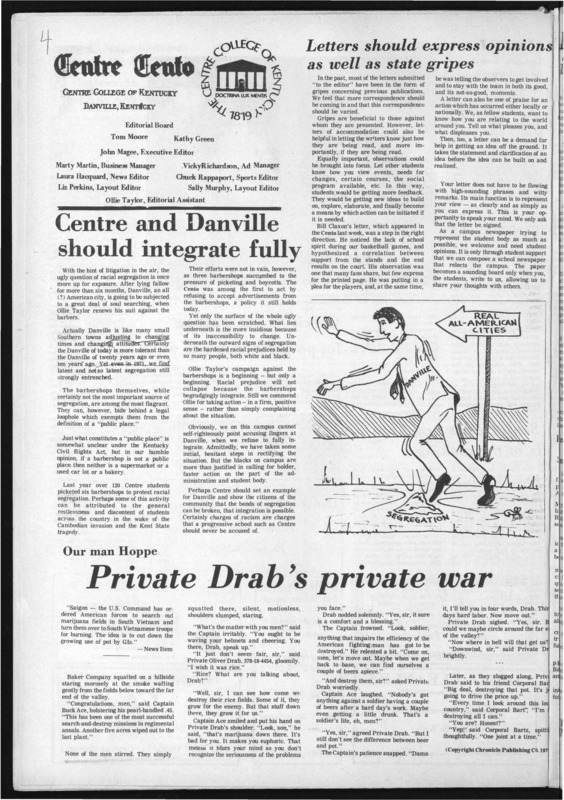 Centre College | Text
Centre College | TextCentre and Danville should integrate fully
Opinion piece regarding the picketing of segregated barbershops. Also commends student Ollie Taylor’s campaign, as well as pointing out that Centre should be an example for Danville as to what integration looks like. Includes corresponding cartoon.Learn more -
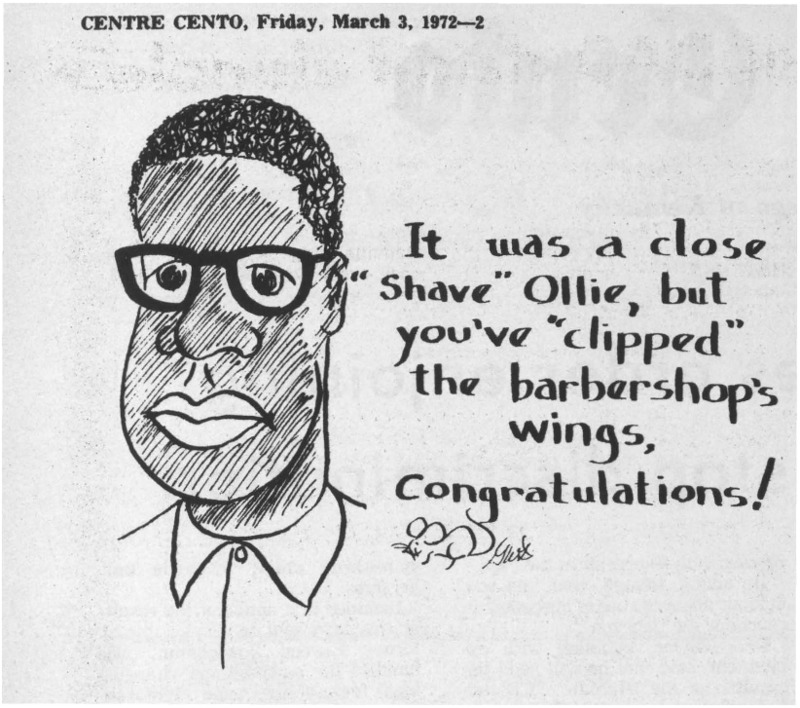 Centre College | Text
Centre College | TextIt Was a Close ‘Shave’ Ollie, but You’ve ‘Clipped’ the Barbershop’s Wings, Congratulations!; Discrimination Ordered Ended
Editorial cartoon celebrating the East District Federal Court order invalidating a section of Kentucky law that allowed Danville barbershops to discriminate against African American customersLearn more -
 Centre College | Text
Centre College | TextJudge Mac Swinford Rules in Favor of Summary Judgement
Explains the next steps in the lawsuit filed against the barbers in Danville that refused to cut black hair. The article emphasizes how students were determined to find a solution to put an end to segregation, even if the case was not ruled in their favorLearn more -
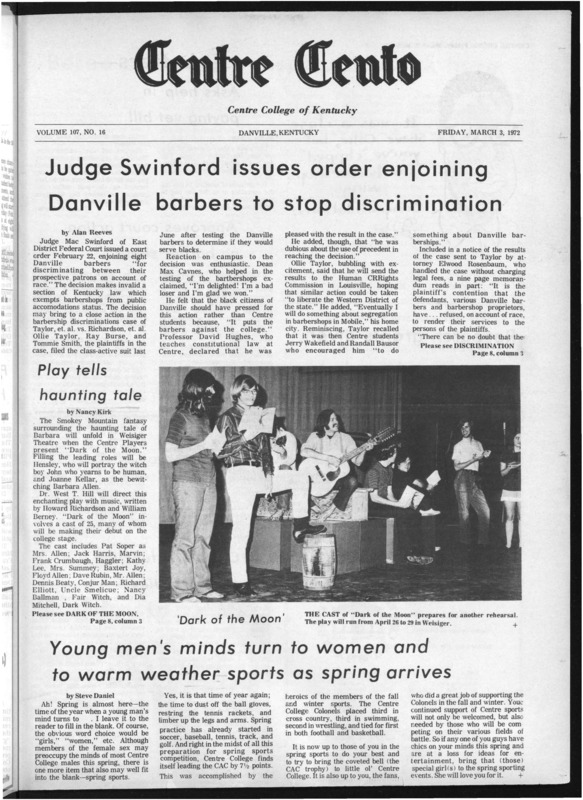 Centre College | Text
Centre College | TextJudge Swinford issues order enjoining Danville barbers to stop discriminating
The article explains how the judge ordered the barbers to integrate. Centre’s Dean expressed his excitement. There appears to be a positive reaction from faculty and staff members which may represent the attitudes of the leadership at this time.Learn more -
 Centre College | Text
Centre College | TextLetter from Conway Boatman to Walter A. Groves stating Union College's present policy on admitting persons of color
Letter from Conway Boatman to Walter A. Groves regarding Union College's policy on raceLearn more -
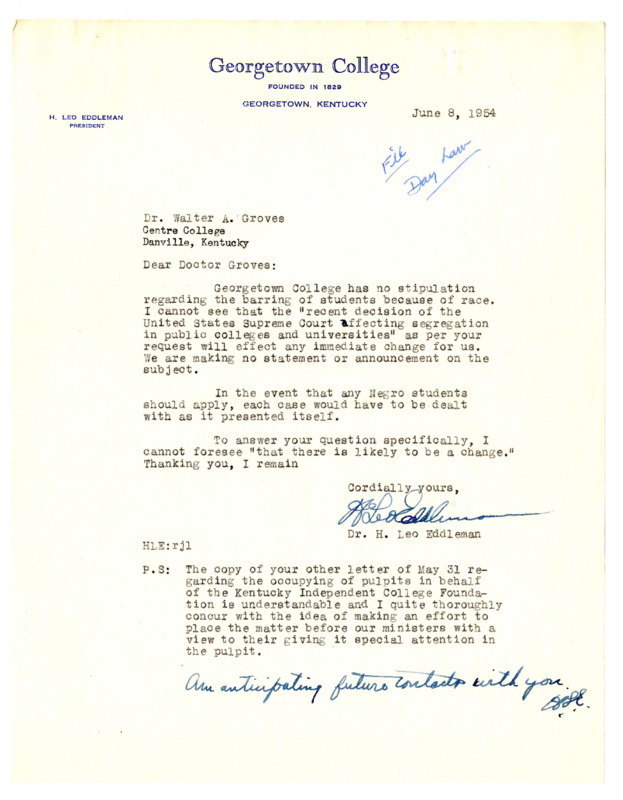 Centre College | Text
Centre College | TextLetter from H. Leo Eddleman to Walter A. Groves stating Georgetown College's present policy on admitting persons of color
Letter from H. Leo Eddleman to Walter A. Groves regarding Georgetown College's policy on raceLearn more -
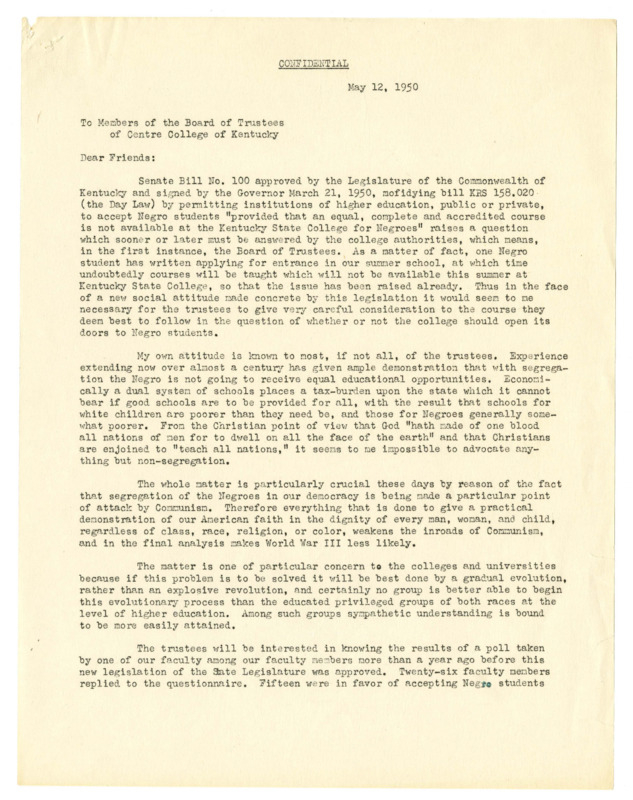 Centre College | Text
Centre College | TextLetter from Walter A. Groves to the Centre College Board of Trustees, May 12, 1950
Letter from President Groves, dated May 12, 1950, to the B.O.T. in which Groves entreats the Board to "give very careful consideration to the course they deem best to follow in the question of whether or not the college should open its doors to Negro students." Groves references Senate Bill No. 100, states his own desire to integrate the College slowly, and references the American minorities faculty questionnaire distributed in January 1949, the results of which showed a majority of faculty respondents in favor of desegregationLearn more -
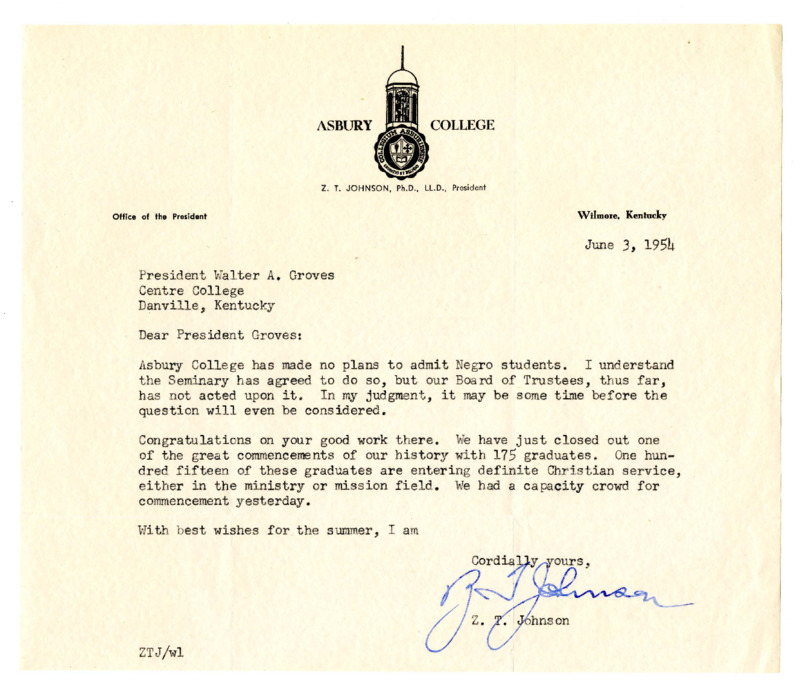 Centre College | Text
Centre College | TextLetter from Z. T. Johnson to Walter A. Groves stating Asbury College's present policy on admitting persons of color
Letter from Z. T. Johnson to Walter A. Groves regarding Asbury College's policy on raceLearn more -
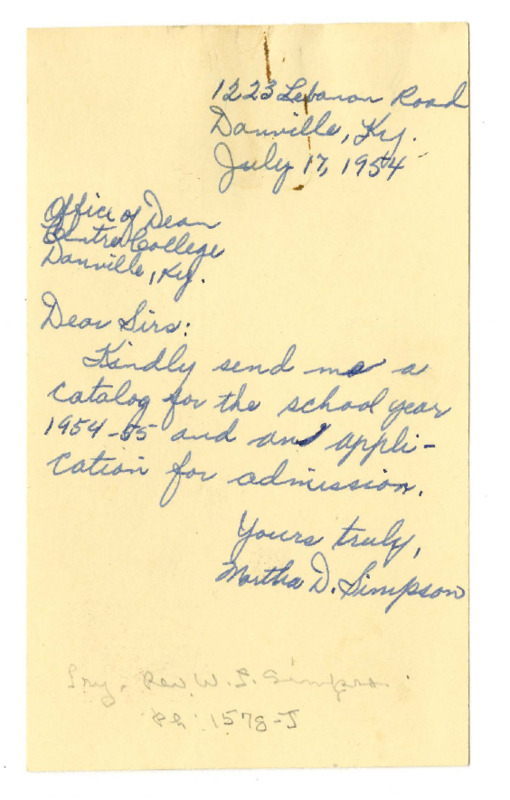 Centre College | Text
Centre College | TextMartha D. Simpson application request letter
Letter from Ms. Martha D. Simpson of Danville, KY, dated July 17, 1954, to the Centre College Office of the Dean, requesting a college catalog and application for admissionLearn more -
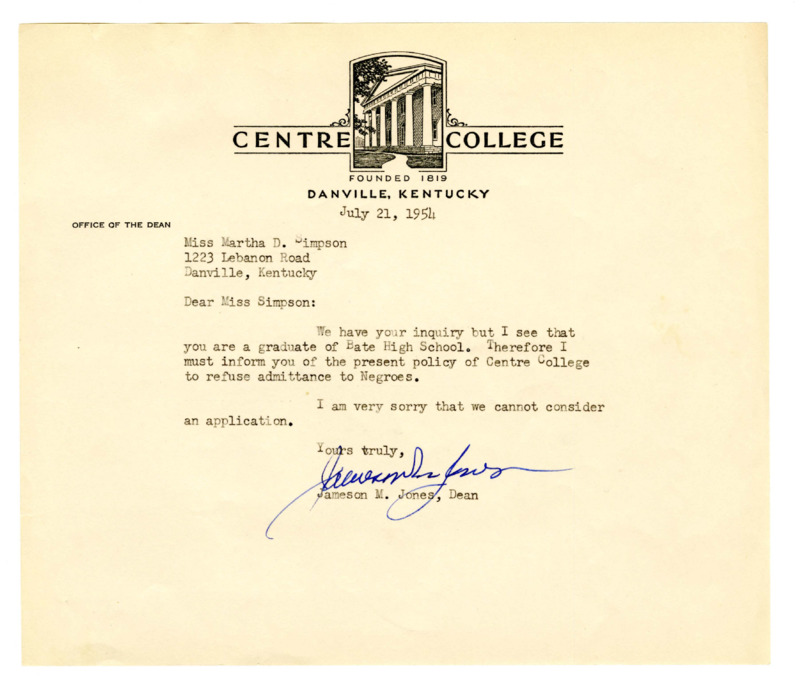 Centre College | Text
Centre College | TextMartha D. Simpson rejection letter
Letter from Centre College Dean Jameson M. Jones to Ms. Martha D. Simpson, dated July 21, 1954, in which he rejects her application for admission to Centre College based upon the fact that Ms. Simpson was a graduate of Bate High School, an all-black school in Danville, and therefore assumed to be a person of color and thus not eligible for admissionLearn more
